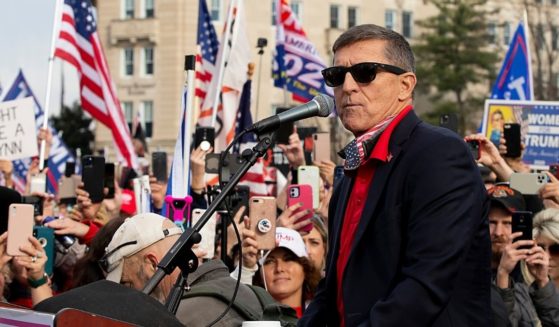
CNN may have the opportunity to write another check for doing its job poorly, this time to relatives of former Trump national security advisor Michael Flynn for labeling them followers of the QAnon conspiracy theory.
You’ll recall CNN reportedly wrote a very large check to former Covington High School student Nicholas Sandmann last year after falsely claiming he had confronted and sought to belittle a Native American gentleman during a protest in Washington, D.C. It was actually that man who had approached and stood toe-to-toe with the teenager.
Sandmann was wearing a “Make America Great Again” hat, and the establishment media read into the encounter what it wanted to see. But when video of the incident started circulating, CNN, The Washington Post and other left-wing outlets had to backtrack.
On Thursday, a federal judge allowed a case brought by Flynn’s brother John “Jack” Flynn and sister-in-law Leslie Flynn to proceed against CNN.
Of course, CNN “news” coverage seems to go off the rails when it deals with any subject or person even remotely tied to former President Donald Trump.
According to U.S. District Judge Gregory Woods’ ruling, the network aired a report this year entitled “CNN Goes Inside A Gathering of QAnon Followers.”
“The report included a brief clip of Lieutenant General Michael Flynn proclaiming, ‘where we go one, we go all.’ Plaintiffs John P. (‘Jack’) and Leslie A. Flynn … are shown in the clip standing next to General Flynn,” wrote Woods, an appointee of former President Barack Obama.
Jack and Leslie stated in their suit against CNN that they are not followers of QAnon. They’re seeking $75 million in damages, saying the network’s reporting defamed them and put them in a false light.
Politico described QAnon as a “popular online conspiracy theory that claimed elites were sexually abusing children and that former President Donald Trump was planning to declare a national emergency to strike back at the shadowy figures engaged in the abuse.”
CNN tried to get the suit dismissed, pointing to tweets posted by Jack that the network’s attorneys said were consistent with the beliefs of QAnon followers.
The Flynns countered that Jack’s tweets showed that he “embraced the Constitution and equal justice under the law . . . not the dangerous, extremist, racist, anti-Semitic and violent beliefs espoused by QAnon” and that he has “denied basic tenets of the QAnon movement.”
As was the case with Sandmann, the Flynns said one of CNN’s major failures was not reaching out to them before publication. Further, they said the network had “no independent evidence to corroborate that [they] were followers or supporters of QAnon.”
Woods dismissed the Flynns’ defamation claim because the applicable law required them to list specific monetary losses that have resulted from CNN’s story. However, the judge allowed the false light claim to proceed.
According to the ruling, the Flynns must show that “[t]here has been some publication of a false or fictitious fact which implies an association which does not exist; [and] [t]he association which has been published or implied would be objectionable to the ordinary reasonable man under the circumstances.”
It would seem that standard was likely met in this case.
“Whether the Flynns were QAnon followers, and in particular, whether the Flynns were ‘followers’ as that word is understood in the context of CNN’s publication, is a highly fact-intensive inquiry,” Woods wrote.
He explained that Jack’s tweets “do not conclusively contradict [the Flynns’] factual allegations.” At this point in the legal proceedings, the couple’s allegations must be accepted at face value.
“These allegations, which the Court must accept as true, are sufficient to plausibly allege that CNN did not have reasonable grounds to believe that the Flynns were QAnon followers,” Woods wrote.
He is allowing the Flynns to amend their defamation claim if they would like the court to reconsider the matter.
Politico noted that Woods “did not discuss whether Jack and Leslie Flynn should be considered public or private figures,” but the magistrate judge who previously reviewed the case determined they were private.
That detail was pivotal in the Sandmann incident because he was clearly a private citizen. Therefore, his attorneys merely had to prove negligence on the part of CNN and other outlets to win in court. A higher standard of knowingly making false statements or exercising a reckless disregard for the truth applies to public figures like politicians if they wish to sue a news outlet.
The establishment media must continue to be held to account for false reporting, and the Flynns may be next in line to teach CNN a lesson.
